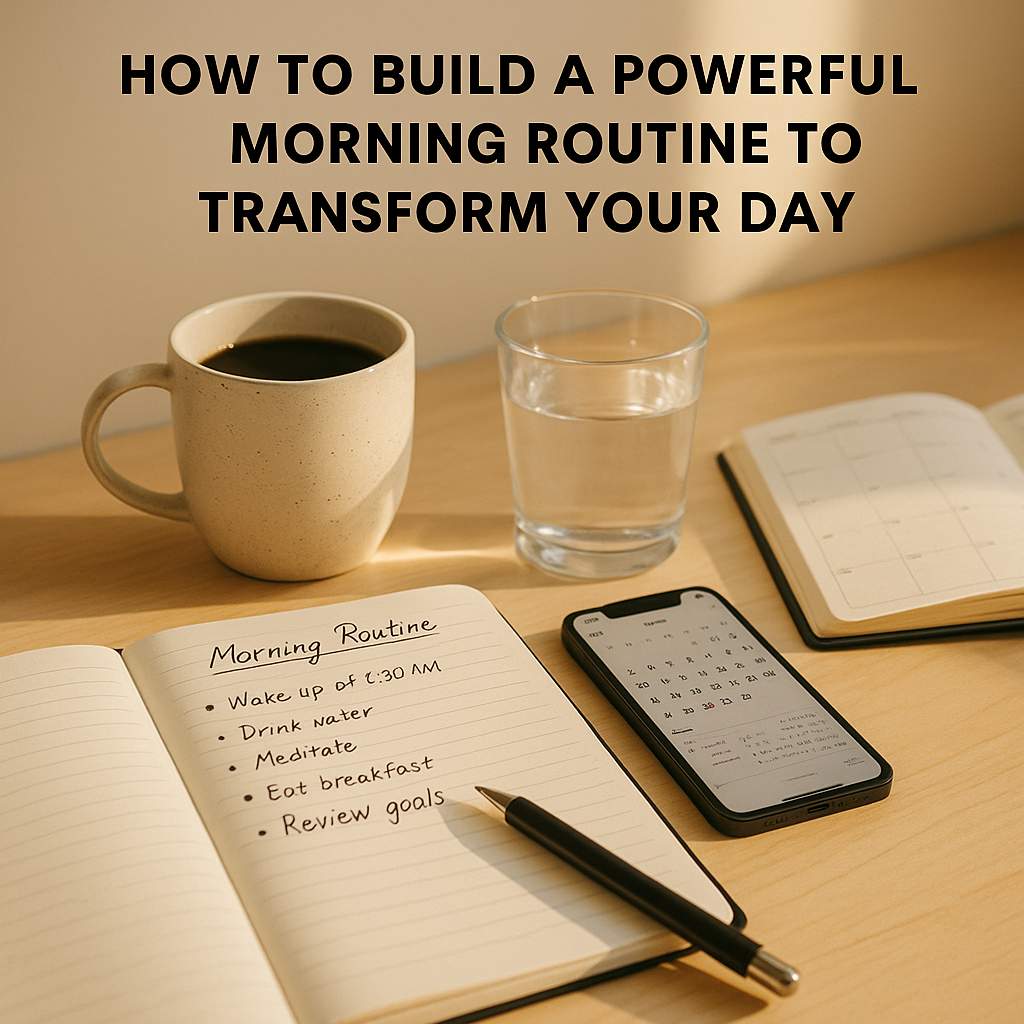Your morning sets the tone for everything that follows. A powerful morning routine isn’t about waking up at 4 a.m. or checking off a hundred tasks before sunrise — it’s about starting the day intentionally, with focus and clarity. Whether you’re a night owl or an early riser, crafting a routine that aligns with your lifestyle can help you boost productivity, reduce stress, and improve your mindset.
Let’s explore how to build a personalized morning routine that truly transforms your day.
Why Your Morning Matters More Than You Think
Many people roll out of bed and jump straight into chaos: emails, social media, rushing to get ready. This reactive start leads to stress and scattered energy. In contrast, a thoughtful morning routine puts you in control.
Benefits of a consistent morning routine:
- Increases focus and mental clarity
- Reduces stress and anxiety
- Enhances creativity and problem-solving
- Creates momentum for a productive day
Step 1: Set a Wake-Up Time That Works for You
There’s a lot of talk about waking up early, but the real goal is consistency — not extremism. Choose a time that allows you to get 7–8 hours of sleep and gives you space in the morning before other responsibilities take over.
Tips:
- Avoid hitting snooze: it disrupts your sleep cycle
- Use natural light or a sunrise alarm to wake gently
- Keep your phone across the room to avoid scrolling
Step 2: Start with Stillness and Presence
Begin your day slowly and intentionally. Take a few minutes to reconnect with yourself before the world rushes in.
Simple practices:
- Deep breathing or short meditation (2–5 minutes)
- Gratitude journaling
- Quiet reflection or prayer
These moments help anchor your mind and shift you into a calm, focused state.
Step 3: Move Your Body (Even Just a Little)
Morning movement boosts your energy, metabolism, and mood. You don’t need an hour-long workout — just move your body to wake up your brain.
Options to try:
- Stretching or yoga
- A quick walk outside
- Dancing to music while you make coffee
The key is to make movement enjoyable, not a chore.
Step 4: Fuel Your Body Wisely
What you eat and drink in the morning influences your energy levels, mood, and cognitive function. Hydration is especially crucial after a night of sleep.
Healthy morning habits:
- Drink a glass of water before coffee
- Eat a balanced breakfast with protein and fiber
- Limit sugar and processed foods that cause crashes
If you’re not hungry early, a smoothie or fruit with nuts is a light but energizing option.
Step 5: Focus Your Mind with Intentional Input
Feed your brain with something positive and meaningful. Avoid diving straight into the news or social media, which can overwhelm you or trigger negativity.
Ideas for intentional input:
- Read a book that inspires or educates you
- Listen to an uplifting podcast or audiobook
- Review your goals or vision board
This sets a constructive mental tone for your day.
Step 6: Review and Visualize Your Day
Take a few minutes to look at your schedule and mentally walk through your day. Visualization helps increase confidence and reduces decision fatigue.
What to review:
- Top 3 priorities for the day
- Any meetings or appointments
- One intention or focus word for the day (e.g., “clarity,” “calm,” “focus”)
Step 7: Keep It Simple and Sustainable
The most effective morning routines are not the longest — they’re the most consistent. You don’t need to do everything every day. Pick 3–5 practices that fit your lifestyle and adapt as needed.
Sample 30-Minute Morning Routine:
- Wake up at 6:30 a.m.
- Drink water and stretch (5 min)
- Meditate or journal (5 min)
- Eat breakfast (10 min)
- Review goals and plan your day (10 min)
Common Mistakes to Avoid
When building a new routine, it’s easy to fall into perfectionism or compare yourself to others. Here are pitfalls to avoid:
- Trying to do too much too soon: Start small and build gradually.
- Copying someone else’s routine exactly: Take inspiration, but customize it to your life.
- Skipping sleep to fit in a long routine: Sleep is non-negotiable for mental performance.
- Being inconsistent: Routines work best when they’re practiced regularly.
Adjusting for Weekends and Travel
Life doesn’t always follow a schedule. That’s okay. The goal isn’t rigidity — it’s consistency. On weekends or while traveling, create a “mini version” of your routine with just the essentials.
Example: On vacation, maybe your mini routine is just meditation and goal review. That’s enough to stay grounded.
Your Morning, Your Power
There is no “perfect” morning routine — only what works best for you. The key is to create intentional time to connect with yourself and set your day up for success. Start small, experiment, and commit to consistency over intensity.
When you take ownership of your mornings, you begin to take ownership of your life.
Your most powerful days start with how you rise.
